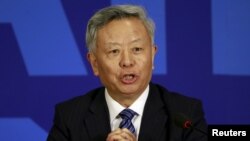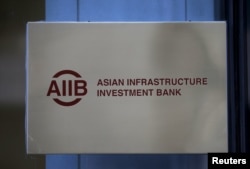The Beijing-backed Asian Infrastructure Investment Bank (AIIB) has chosen two projects to sponsor for its first foray into infrastructure investment and both are linked to Chinese President Xi Jinping's new Silk Road plan.
But in an apparent move to help deflect criticism that AIIB has a political agenda, the Asian Development Bank and European Bank for Reconstruction and Development are co-sponsoring the projects, analysts said.
"Tying up with other multilateral development banks can help AIIB to deflect the suspicion that it is focusing on China's Silk Road program," said Jacob Kirkegaard, a senior fellow at the Washington based Peterson Institute of International Economics. "AIIB is conscious of its reputation because it expects to obtain high credit ratings for raising funds."
Since its emergence, the AIIB has been portrayed in China as a new and better alternative to existing development banks. It has also been seen as a new point of friction with the United States and Japan, which have refused to join.
“China is the largest shareholder of the bank, but it is only one shareholder and I can tell you the bank will not do anything that is driven by politics, and will not interfere in political affairs,” Jin Liqun, AIIB president recently told the Financial Times. “Now some people are skeptical, particularly since I am a Chinese Communist party member, but let me ask you one question: If we really wanted to run this bank à la Chine, then why would we go to all this trouble [to convince western countries to join]?”
"Safe projects" for new player
Analysts believe that in cooperating with the AIIB, the two well-established multilateral banks may have shared with the new player these "safe projects" that they have already assessed, and found bankable. Both of the investments are for road projects, which stand a good chance of repaying their loans through the use of toll taxation.
In the Pakistan project, it is the ADB that will act as the lead financier, sparing some of the risks for the new comer. The project is for the M4 highway, a 64-kilometer stretch of motorway connecting Shorkot to Khanewal in Pakistan's relatively better developed Punjab Province. The second, a road linking Dushanbe in Tajikistan with the Uzbek border, will be jointly financed by the
AIIB and EBRD.
In a recent statement, the AIIB said "EBRD's Board of Directors has just approved the project for financing, and AIIB's Board is expected to consider AIIB financing in June." The statement added that the two banks are considering more infrastructure projects in Central Asia as well.
Silk Road
Still, Central Asia and Pakistan are the two closest and most important paths through which China’s massive One Belt, One Road project will pass. Both projects will reinforce existing road links from China. The Punjab project is part of the $46 billion China Pakistan Economic Corridor launched by President Xi last year. There is an existing road, AH66, that runs from Dushanbe to China's Xinjiang province, before connecting to the Karakoram highway that connects China to Pakistan.
The World Bank has also entered into a co-financing deal with AIIB, although it is not yet known what kind of projects it will choose to fund. In case the World Bank agrees to support a Silk Road project, analysts said, the ambitious Chinese program will end up obtaining one of the highest forms of endorsements that can open up many other financial options.
The One Belt, One Road policy, which has been spearheaded by Xi Jinping, is one of his key agendas as China’s leader. The project is a combination of a new Silk Road plan, which seeks to link China’s western region with Central Asia, Europe and the Middle East. The maritime trade routes, or Belt, pass through Southeast Asia and on to Africa.
"It is possible that the AIIB choose to co-finance its first project in Pakistan with the ADB in an effort to assuage suspicions that the project reflects China's geopolitical priorities," said Paul Haenle, director of the Beijing based Carnegie-Tsinghua Center for Global Policy.
But he thinks that the new bank, which has 57 member countries, should be judged only after it has conducted more lending operations. It is essential to wait and see if the AIIB finances projects outside the Belt and Road Initiative, he said.
"It would be cynical to assume from the outset that it will be used to advance Chinese government priorities such as the Belt and Road initiative, which is still in its infancy in terms of conception and implementation," Haenle said.
Dealing with NGOs
One major concern about the AIIB, and the main reason why the United States and Japan have yet to join, is whether it will be as open and transparent in dealing with non-government organizations (NGOs), raising issues that pose challenges to all lenders.
NGOs are known to challenge project assessments by the World Bank and ADB on the grounds that they would result in serious relocations of local populations or environmental damage.
But just how NGOs will interact with the AIIB is still unclear.
"The NGO community is trying to figure out its relationship with the new bank. It is located in Beijing, which is not noted for its openness towards NGOs," said Robert Orr, a former U.S. representative on the board of ADB who served until last December. "It has talked about implementing high environmental standards. But the proof is in the pudding."
Haenle also expressed worry, pointing to recent Chinese moves to bring NGO activities "under a national security lens, as exemplified by the passage of a new foreign NGO law last month."






